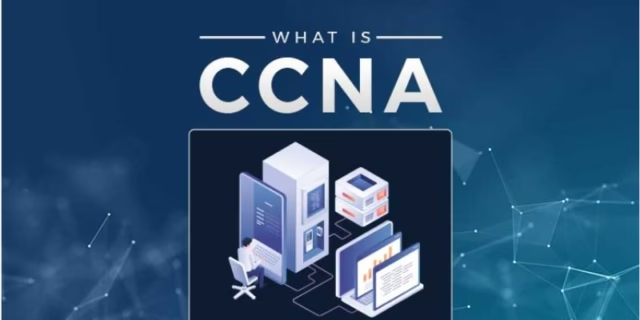Networking has become the backbone of every business, from small startups to global enterprises. With organizations heavily dependent on interconnected systems, the demand for skilled networking professionals has grown rapidly. Cisco Certified Network Associate (CCNA) certification is often considered the first and most important step toward a successful career in networking. Many learners choose a CCNA Course in Chennai to build strong fundamentals and gain recognition in the IT industry. This certification not only equips you with essential knowledge but also positions you as a qualified candidate in a highly competitive job market.
Understanding the Importance of CCNA Certification
The CCNA certification is globally recognized and offered by Cisco, one of the most trusted names in networking. It validates your ability to install, configure, operate, and troubleshoot medium-sized routed and switched networks. More than just an entry-level certification, CCNA demonstrates that you have practical, hands-on knowledge of networking, which employers value. Since networking is integral to IT infrastructure, professionals with CCNA certification become assets to organizations seeking reliable and secure communication systems. This global recognition makes CCNA a stepping stone not just for local job opportunities but also for careers abroad.
Skills Acquired Through CCNA Certification
One of the major reasons CCNA certification acts as a gateway to networking careers is the strong foundation it provides. Learners acquire a wide range of skills, including:
1. Network Fundamentals
CCNA ensures you understand the basics of networking, such as IP addressing, subnetting, and routing concepts. These skills are essential for configuring networks from scratch.
2. Routing and Switching
The certification trains you to manage routers and switches, which are core components of any network. You learn how data travels efficiently across multiple paths and how to optimize connections.
3. Security Essentials
With rising cyber threats, CCNA introduces candidates to basic network security concepts, such as access control lists, firewalls, and secure communication protocols.
4. Automation and Programmability
Modern CCNA certifications also cover network automation, cloud integration, and programmable infrastructures, preparing you for emerging technologies.
5. Troubleshooting
CCNA-certified professionals are adept at identifying and solving network problems quickly, ensuring minimal downtime and smooth communication.
These skills form the foundation of a career in networking, enabling professionals to adapt to advanced certifications and real-world challenges.
Career Opportunities After CCNA
CCNA certification opens up a variety of job roles in the IT industry. Some of the most common career paths include:
Network Engineer
Responsible for designing, implementing, and managing networks, network engineers ensure that communication within an organization runs smoothly.
Network Administrator
They oversee day-to-day operations of a network, including monitoring performance, applying updates, and troubleshooting technical issues.
Technical Support Engineer
Support engineers help businesses solve network-related issues faced by end-users or clients, providing technical expertise and guidance.
IT Helpdesk Professional
With CCNA knowledge, helpdesk professionals can handle basic networking issues, improving their career prospects and moving toward advanced roles.
Security Specialist
Since CCNA covers fundamental network security, certified professionals can specialize in cybersecurity roles by gaining advanced certifications later.
In addition to these roles, CCNA certification can be a stepping stone to advanced Cisco certifications such as CCNP (Cisco Certified Network Professional) and CCIE (Cisco Certified Internetwork Expert). These higher-level certifications lead to senior-level positions with significantly higher salaries.
Why Employers Value CCNA
Organizations recognize CCNA as proof that a candidate has practical networking skills. Employers often prefer certified professionals because:
- They can handle real-world networking issues effectively.
- They bring credibility and assurance of knowledge validated by Cisco.
- They are adaptable to new technologies since CCNA includes updated concepts like cloud networking and automation.
- They reduce training time for companies because they already possess standardized skills.
As a result, CCNA-certified professionals are more likely to secure job interviews, negotiate better salaries, and enjoy faster career growth compared to non-certified peers.
Role of CCNA in Career Growth
For freshers, CCNA is often the first certification that opens doors to the IT industry. It builds confidence and enhances employability. For working professionals, CCNA acts as a skill booster, helping them secure promotions or transition into specialized networking roles. Moreover, the certification is not limited to IT graduates. Even students from non-IT backgrounds who complete a CCNA course can find opportunities in technical support, system administration, and networking roles.
Global Recognition and Opportunities
Another reason why CCNA certification is considered a gateway is its global acceptance. Whether you are seeking a career in India or planning to work abroad, CCNA adds significant weight to your resume. International employers recognize the certification as a standard measure of networking knowledge, increasing your chances of landing global opportunities.
Preparing for a CCNA Certification
Success in CCNA requires structured training and hands-on practice. While self-study is possible, many learners prefer enrolling in professional training programs to gain practical lab experience and mentorship. Taking a Power BI Courses in Chennai ensures you receive guidance from industry experts, real-world networking practice, and access to updated course content aligned with Cisco’s requirements.







